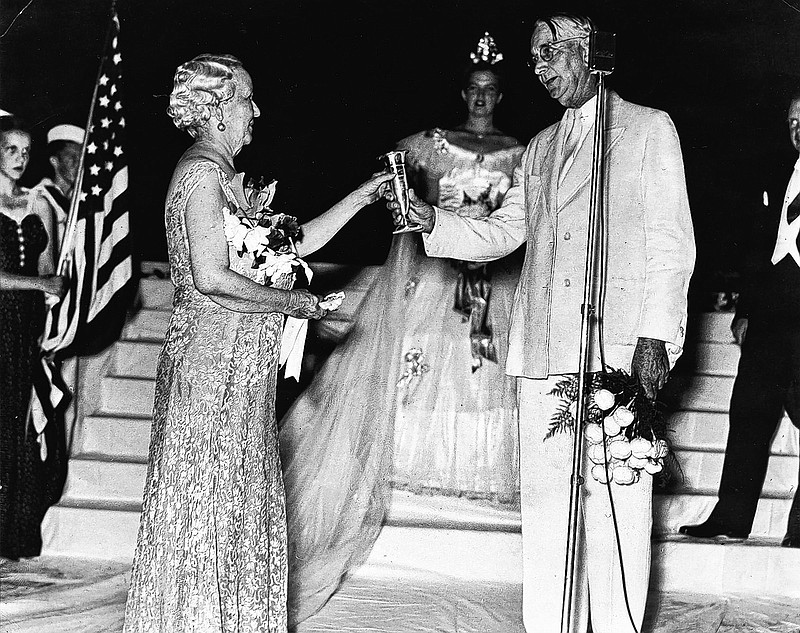On Sept. 21, 1940, more than 200 Chattanoogans gathered in the ballroom of the Hotel Patten to honor Miss Zella Armstrong. Lauded for "loving her city, her state, her nation and her Southland, with a fervor and a constancy that few could boast," Miss Zella was presented with a commemorative silver medal, one side proclaiming her as "Chattanooga's No. 1 Woman Citizen," the other depicting the flags of the city, Tennessee, United States and the Confederacy.
The "No. 1 Woman Citizen" of 1940 is little remembered today, although one of her legacies to local debutantes and their families continues on a yearly basis.
Zella Armstrong was born in 1872, the daughter of Maj. John M. Armstrong and his wife, Martha Turnley Armstrong. Maj. Armstrong started the Civil War as a Confederate lieutenant in Chattanooga's Lookout Artillery, which was called by its commander "the darling and the pride of the city, being composed, as it were, of its very best blood."
When Federal troops shelled Chattanooga in early June 1862, Armstrong commanded the gun that returned fire. Miss Zella was raised to be proud of her father's service to the Confederacy.
Miss Zella attended local schools, then Grant University (later the University of Chattanooga) and a girls' school in New York. There she demonstrated an early literary bent in a letter in The Chattanooga Times describing the stately buildings on her stroll down Fifth Avenue from Central Park to Washington Square.
She became one of the founders and a former president of the Tennessee Women's Press Club, social chairman of the Tennessee Valley Celebration of 1940, a founder of the Chattanooga Area Historical Association, a long-time member of the Tennessee Historical Commission and a member of the Daughters of the American Revolution and the United Daughters of the Confederacy.
In 1908, she began publication of The Lookout, a journal of social and historical items that for many years appeared on a weekly basis.
In her last years, Miss Zella directed the magazine's publication from her bed in a nursing home. As her obituary noted, "Miss Armstrong's abilities of recollection remained amazingly strong, and she maintained an active interest in the community until her death." The last issue was published not long after her death on April 12, 1965.
Miss Zella's primary interest was in historical and genealogical matters. Her most impressive work was "The History of Hamilton County and Chattanooga, Tenn.," in two volumes, which prompted County Judge Will Cummings to appoint her Hamilton County historian.
She published some 20 genealogical sketches and papers, including several volumes of Notable Southern Families and wrote columns for the Chattanooga News-Free Press. In 1950, she published a book titled "Who Discovered America?" which presented for consideration that the new world was discovered in the year 1171 by Madoc of Wales.
Miss Zella was also a poet and a playwright. At the dinner honoring her in September 1940, her poem "O Tennessee, Thy Stars are Three" was set to music and sung.
Miss Zella was also a historical preservationist, being involved in the preservation of the Chief John Ross House, the Brainerd Mission and the house where Gen. Ulysses S. Grant maintained his headquarters. She opposed the project that leveled Cameron Hill and the alteration of Moccasin Bend for the purpose of the construction of Interstate 24.
Miss Zella's ongoing legacy to Chattanooga is the Cotton Ball. She was the "promoter, designer and exhibitor" of the ball, which she "started in the midst of the Depression years as an effort to preserve traditions of the old South." A 1941 article noted that "to her alone went the credit for the success of the function."
At her death, The Chattanooga Times noted that she founded the event "so that the young ladies of today might catch a glimpse of the kind of social niceties their Southern forebears knew generations ago." On the ball's fifth anniversary, Miss Zella was given a silver goblet filled with silver coins, "which she accepted with great emotion."
The Cotton Ball figured into Miss Zella's tribute in 1940, as Will Shepherd led the crowd in "Let Me Call You Sweetheart." When asked to speak, Miss Zella begged to be excused.
She "simply had not words" to accept the praise, holding that any merit in her must have been only "in the eyes and hearts of her friends."
Sam D. Elliott, an attorney with Gearhiser, Peters, Elliott & Cannon, is a member of the Tennessee Historical Commission. For more information, visit Chattahistoricalassoc.org.
